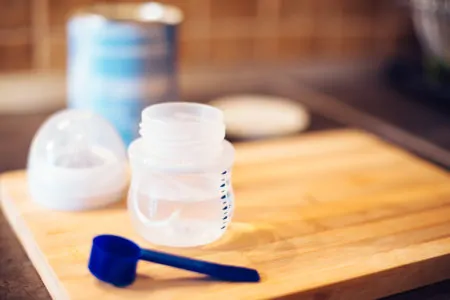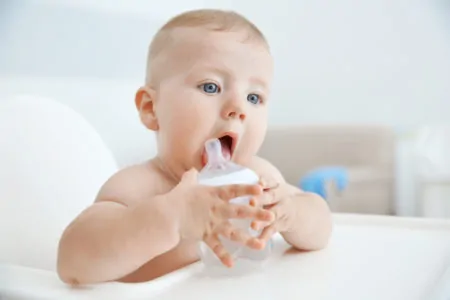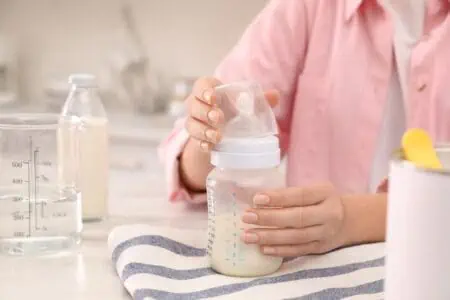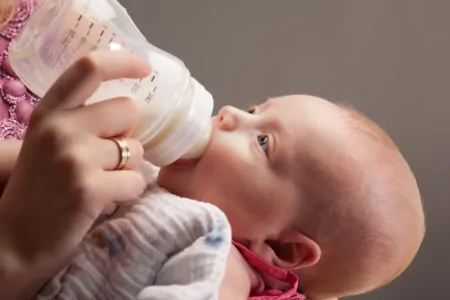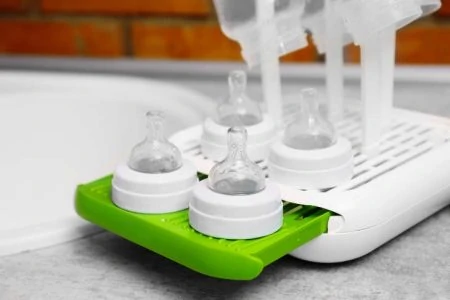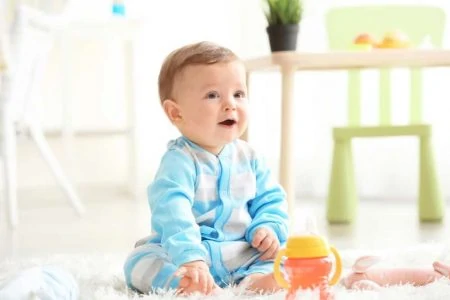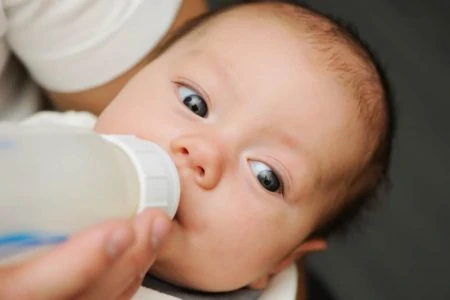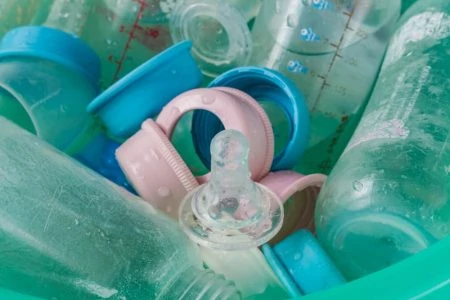Figuring out what water to use in baby formula feels like a high-stakes chemistry test. You know hydration is crucial, but are all water sources created equal? Not exactly. While water might look the same, hidden minerals and chemicals in certain types can impact your baby’s developing teeth and gut health.
Before you turn on the tap or crack open a bottle, it is important to know what is actually going into your little one’s bottle.
Is tap water safe, or should you stick to bottled? Let’s dive in.
Key Takeaways
- Distilled water is a safe, pure choice for formula but lacks minerals needed for older babies.
- Well water requires strict testing for toxins and nitrates before use; boiling does not remove heavy minerals.
- Tap water is generally safe and economical, but you should test for lead and follow local boiling guidelines.
- Bottled water works well but can be pricey; check labels to ensure fluoride levels aren’t too high.
Using Distilled Water for Baby Formula
Distilled water is essentially steam that has been condensed back into a liquid. This process removes impurities, making it an ultra-clean option for your baby’s bottle.
Is it Safe?
Yes, distilled water is generally very safe for mixing with baby formula. While the distillation process strips away minerals, your baby will still get the necessary nutrients directly from the formula powder itself.
Keep In Mind
While distilled water is great for mixing formula, it should not be the only water your child drinks once they start sipping plain water. Because it is so pure, it lacks beneficial minerals like calcium and magnesium found in other water sources.
Exclusive use of distilled water later in life doesn’t replace nutrients lost through sweat and could potentially lead to an electrolyte imbalance (1). Also, distilled water lacks fluoride, which helps protect the teeth of older infants and toddlers.
Using Well Water for Baby Formula
Well water comes from ground reservoirs and is often rich in natural minerals. Millions of families rely on private wells, but they require a bit more vigilance when it comes to infant safety.
Is it Safe?
You need to be cautious here. Well water can harbor bacteria or toxins that are risky for tiny immune systems.
If you rely on a well, you must test the water before using it for formula. Do not assume boiling makes it safe. Boiling kills bacteria, but it does not remove nitrates or heavy metals. In fact, boiling can actually concentrate these minerals, making the water more dangerous.
Contact your local health department for testing kits. Since experts recommend heating water to at least 158 degrees F (70 degrees C) to kill bacteria in formula powder, well water is often not the most convenient or safest first choice (2).
Keep In Mind
Regular testing is non-negotiable with well water. Microorganisms can contaminate your supply without changing the taste or smell. Even if your water tests clean, the Journal of Pediatric Gastroenterology highlights risks regarding Salmonella and other infections, so proceed with caution.
Baby Formula with Spring Water (Artesian)
Spring water, sometimes called artesian water, comes from deep underground reservoirs. It is rarely pumped into homes and is usually sold in jugs or bottles.
Is it Safe?
Usually, yes. However, many parents stick to distilled water to control mineral intake. Spring water that is purified and meets FDA standards is safe to use, though boiling it first is still a good practice.
Avoid “raw” spring water straight from the source, as it hasn’t been treated for bacteria or contaminants.
Keep In Mind
The mineral content in spring water varies by brand and location. Since formula is already scientifically balanced with the minerals your baby needs, adding mineral-heavy water might overload their system. This is why many pediatricians lean toward distilled water for mixing.
What About Bottled Water?
Bottled water is often the hero when you are traveling or during a boil-water advisory. “Nursery Water” is a specific type of bottled water marketed just for babies, but it isn’t your only choice.
Many bottled waters contain fluoride. While fluoride is good for teeth, babies under 6 months don’t really need it. If your tap water lacks fluoride and your doctor prescribed supplements, you definitely don’t want to double down by using fluoridated bottled water.
Look for labels that say purified, distilled, deionized, demineralized, or prepared by reverse osmosis. These are all solid options. All bottled water sold in the U.S. must meet strict FDA safety standards.
Is it Safe?
Yes, U.S. bottled water is safe. However, unless the bottle specifically says it is sterile or distilled, you should boil it to be absolutely sure no bacteria is present.
Keep In Mind
The main downside here is the cost. Constantly buying jugs of water adds up, and the plastic waste is a concern for many families.
Using Tap Water for Baby Formula
Thanks to modern home filtration systems, tap water is the go-to for many parents. It is easy, cheap, and generally safe in most municipalities.
Just remember that standard pitcher filters (like Brita) generally do not remove fluoride. To be safe against bacteria in the formula powder itself, the recommendation remains to heat water to 158 degrees F (70 degrees C) (3).
Is It Necessary to Boil the Water?
Old-school advice was to always boil water. Today, the guidance is a bit more nuanced.
The American Academy of Pediatrics (AAP) suggests that if you have a safe, tested water source, you may mix formula with room-temperature water. Boiling isn’t always mandatory for the water itself, but it is the only way to kill bacteria (Cronobacter) that might live in the formula powder.
If you are unsure about your water quality, boil it. Bring cold tap water to a rolling boil for one minute, then turn off the heat. Let it cool for no more than 30 minutes before mixing. This ensures the water is hot enough to sanitize the powder but not so hot it destroys nutrients. Check out the AAP guidelines for more details.
Important: Do not boil water for longer than one minute. Excessive boiling evaporates the water and leaves behind a higher concentration of impurities.
Always test the bottle temperature on the inside of your wrist before feeding.
Warning Never Dilute Formula
The Lead Factor
Lead is a major concern in older homes with outdated plumbing. If your water has high lead content, boiling it actually makes it more dangerous because the lead concentrates as the water evaporates. Lead exposure causes serious developmental issues. If you have any doubts, have your tap water tested for lead immediately (5).
Fluoride and Baby Formula
If your local water supply is heavily fluoridated, you need to pay attention to how often you use it for formula.
Fluoride strengthens tooth enamel, but too much of it during infancy can cause dental fluorosis. This isn’t a disease, but it causes faint white streaks or discoloration on the adult teeth that are still forming under the gums (6).
To avoid this, consider alternating between tap water and distilled bottled water. This creates a balance where your baby gets some fluoride protection without overdoing it (7).
You can verify the fluoride levels in your area by calling your local water utility. Ideal levels are usually around 0.7 parts fluoride per million parts water (8).
I have many parents in my practice who are concerned about claims of other harmful effects of fluoride, which are unproven but prevalent on the internet. They often resist giving their infant or older child fluoride supplementation, assuming that regular dental care and the use of fluoride toothpaste is sufficient. As mentioned above, fluoride is beneficial to teeth that have not yet erupted. When given at the appropriate age and amount, there is no harm (9).
Editor's Note:
Dr. Leah Alexander, MD, FAAP